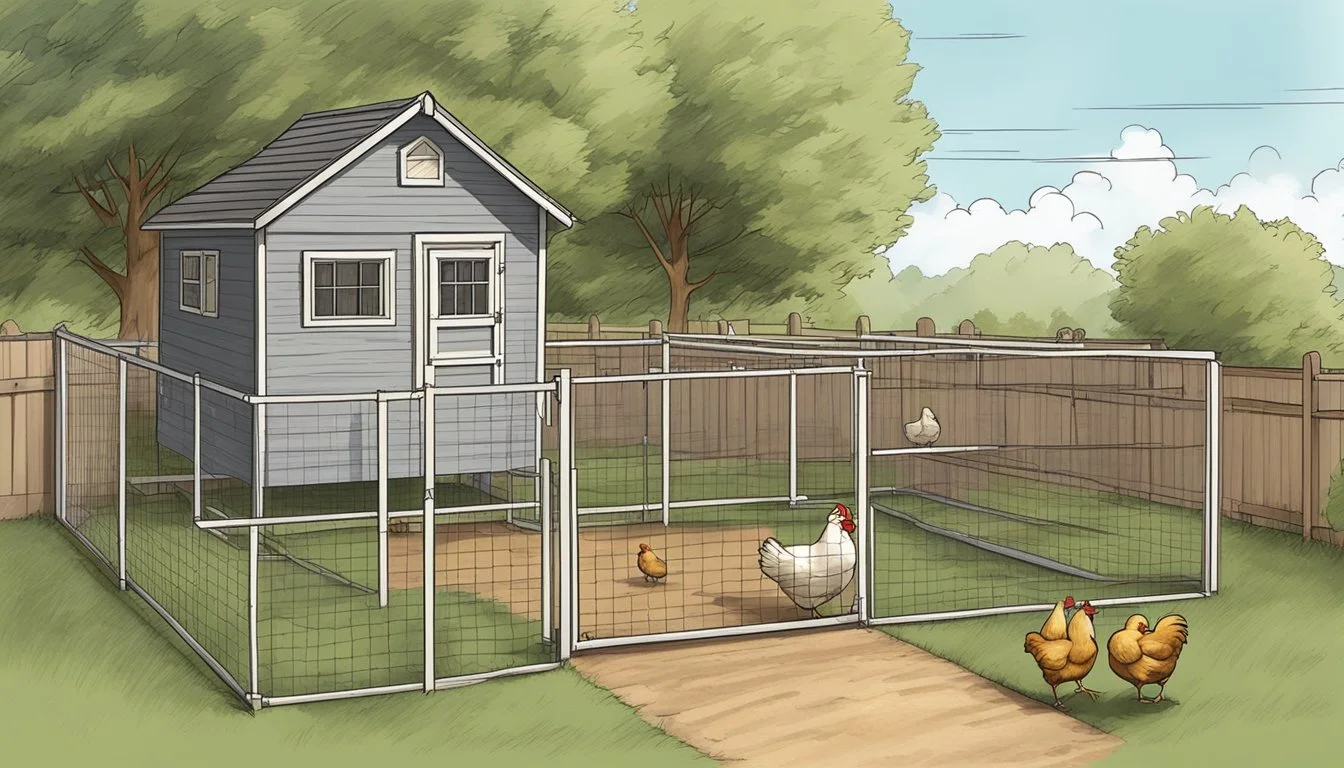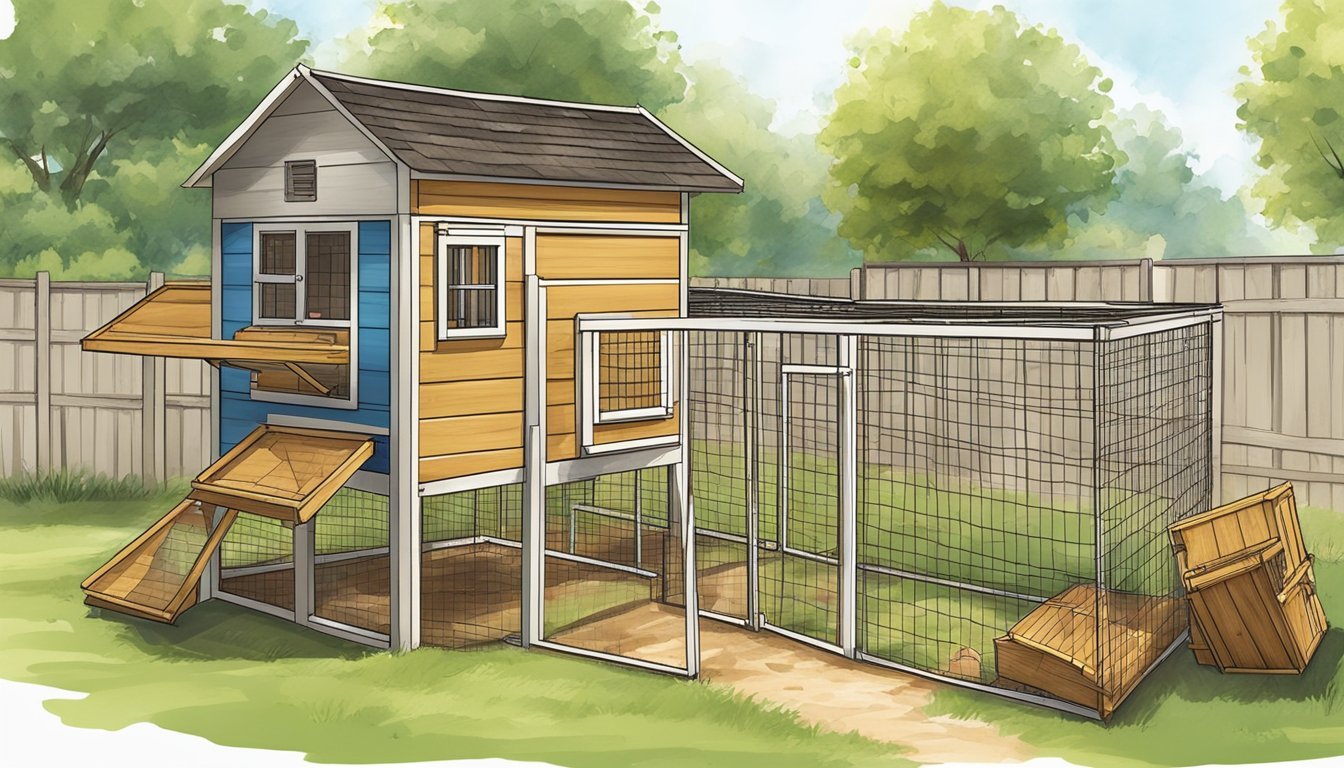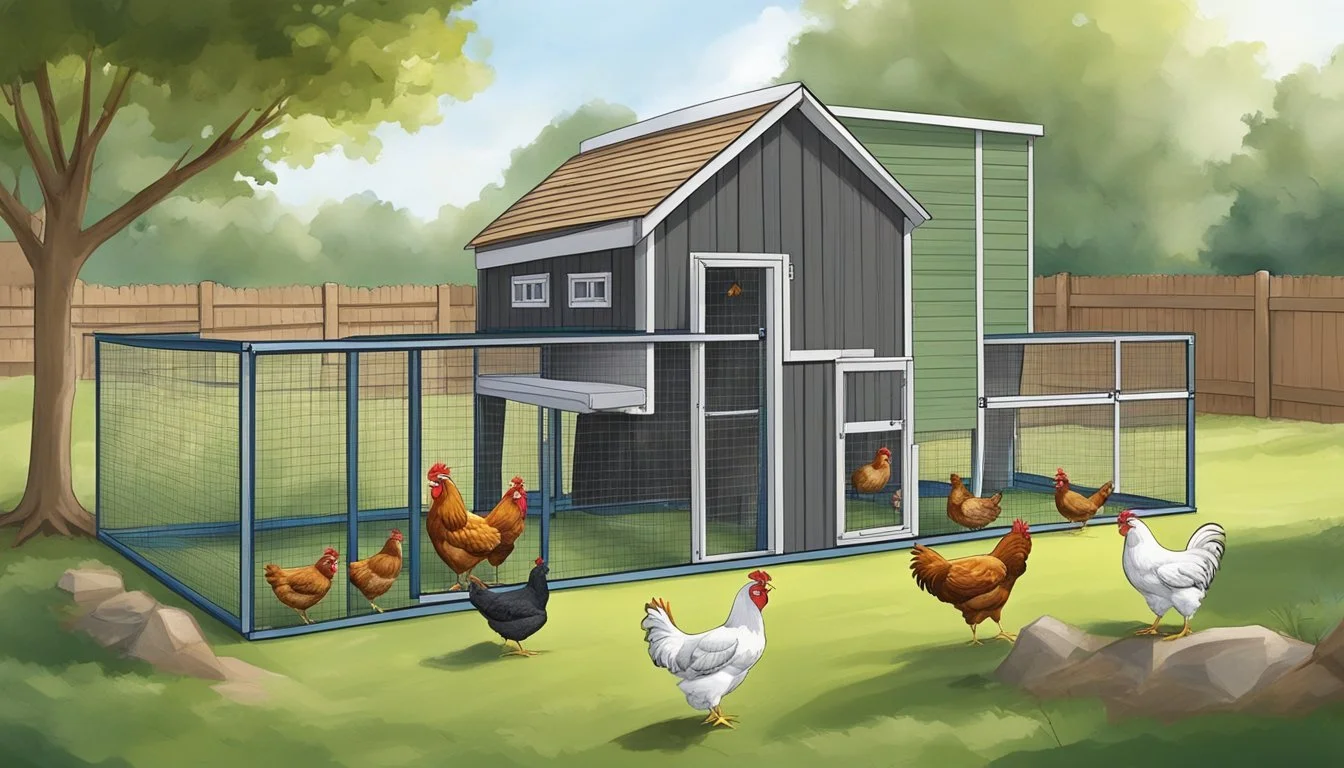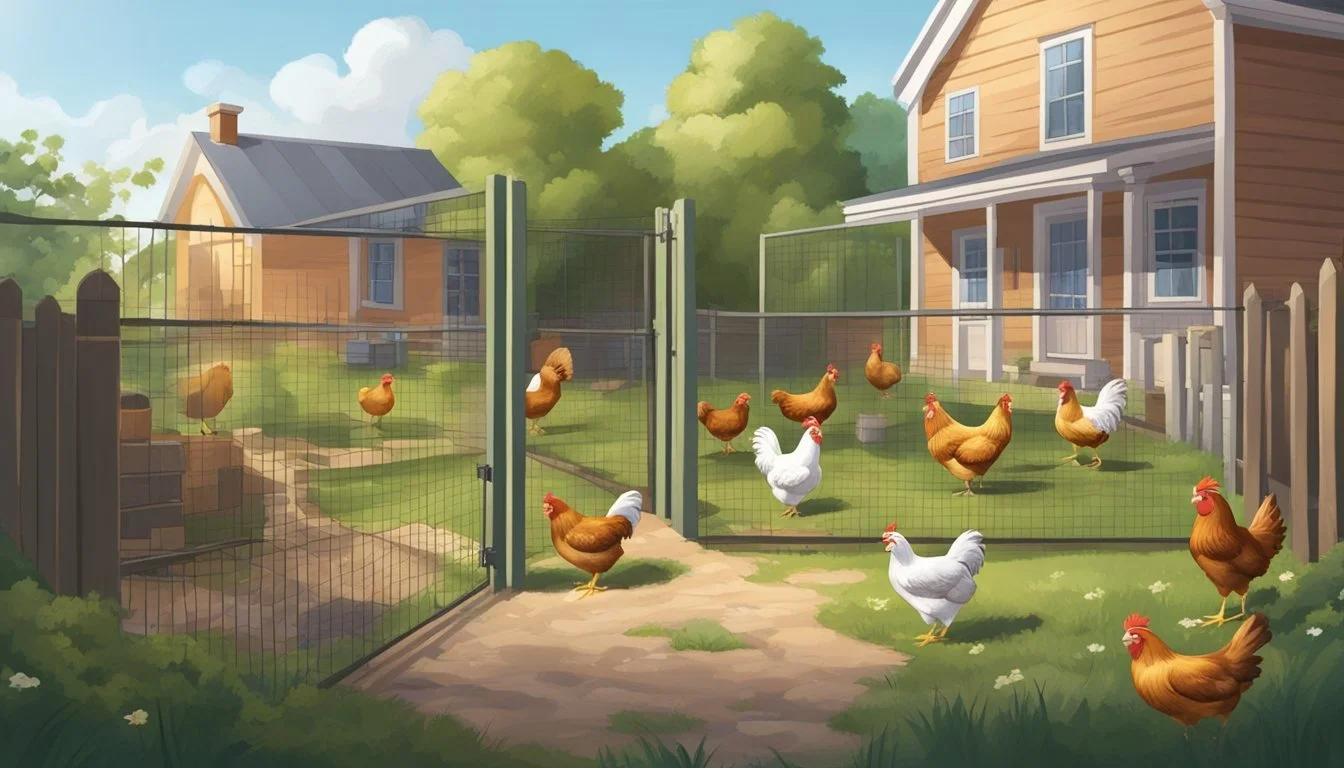Keeping Backyard Chickens in Broken Arrow, OK
Essential Tips for Success
Residents of Broken Arrow, Oklahoma, who are considering joining the growing trend of raising backyard chickens (how long does chicken last?) will find the city's regulations accommodating with certain limitations. Raising chickens provides an opportunity for a sustainable lifestyle, allowing individuals to produce their own eggs and, for some, even meat. Nevertheless, doing so requires adhering to specific municipal ordinances designed to balance the activity with neighborhood harmony and public health concerns.
In Broken Arrow, homeowners are allowed to keep chickens on their property, although the number of domestic animals is limited to fewer than five for standard residential lots. This limitation ensures that residents can enjoy the benefits of backyard chickens without creating issues that can arise from maintaining a larger number of animals in an urban setting. Those with property zoned agricultural or residential spaces that are unplatted are exempt from these restrictions, offering more flexibility for chicken-keeping endeavors.
Important regulations stipulate that roosters are not permitted, due in part to noise concerns, and detailed guidelines outline the placement of chicken coops. They must be located at a minimum distance from grocery stores, food establishments, and schools unless the property lies within an agricultural district. This careful consideration of coop placement is critical to maintaining the aesthetics and functionality of residential and commercial areas within the city.
Understanding Local Chicken Ordinances
Residents of Broken Arrow, OK, considering keeping backyard chickens must navigate local ordinances and compare these with other Oklahoma municipalities for a comprehensive understanding of regulations.
Overview of Chicken Laws in Broken Arrow, OK
In Broken Arrow, the city code allows residents to keep chickens on their property. Specifically, the local chicken laws state that a person may not keep, harbor, or possess five or more domestic animals without adhering to certain conditions. Properties that are zoned agricultural (A-1) or those that are unplatted and zoned residential are granted exceptions to this rule.
Key Regulations Include:
Limitation on the number of chickens allowed without a permit.
Prohibition of roosters to mitigate noise concerns.
Requirements for housing structures to adhere to property setback rules.
Residents are advised to consult the latest city code or contact local authorities to confirm current regulations, as ordinances may be subject to change.
Comparison with Other Oklahoma Municipalities
Comparisons with chicken ordinances in other Oklahoma municipalities reveal a diversity of local regulations.
Oklahoma City: Generally allows backyard chickens but with specific regulations about the number allowed and enclosure requirements.
Norman: Also permits backyard chickens, with requirements for enclosures and maintenance to prevent nuisance or sanitation issues.
Stillwater, Edmond, and Tulsa: Similar to Broken Arrow, have their own sets of ordinances that might vary in terms of the number of chickens allowed, enclosure specifications, and distances from neighboring dwellings.
Midwest City and Lawton: Regulations can be more restrictive, with Lawton prohibiting chickens in most residential areas.
A comparative table for quick reference:
Municipality Maximum Chickens Allowed Roosters? Zoning Restrictions Broken Arrow Not specified No A-1, Unplatted Residential Exempt Oklahoma City Regulated Not specified Enclosure specifics applied Norman Regulated Not specified Enclosure & sanitation requirements Stillwater Regulated Not specified Enclosure & property setback rules Edmond Regulated Not specified Specific city code adherence Tulsa Regulated Not specified Based on zoning requirements Midwest City More restrictive Likely No Enclosure & sanitation requirements Lawton Generally prohibited No Against in most residential areas
It is crucial for residents in any Oklahoma municipality, including Broken Arrow, to review their respective city code and stay up-to-date on zoning requirements that could affect their ability to keep chickens legally on their property.
Setting Up Your Chicken Coop
When setting up a chicken coop in Broken Arrow, OK, residents must select a suitable location, determine whether to build or buy a coop, and ensure the coop provides ample space and security for their backyard chickens.
Selecting the Right Location
The right location for a chicken coop is vital for the health and safety of the chickens. It should be on high ground to avoid flooding and provide good drainage. Ample sunlight is beneficial, but the coop also needs shaded areas to protect chickens from heat. Proximity to the house can be convenient for care and monitoring but consider local regulations for distance from property lines.
Building or Buying a Coop
When deciding between building or buying a chicken coop, consider skill level, budget, and time constraints. A pre-built coop is a convenient option but may cost more. If building a coop, materials should be durable and weather-resistant, like cedar wood, and all hardware should be rust-proof. Coops should be designed to provide:
Ventilation
Insulation for varied weather
Easy access for cleaning and egg collection
Ensuring Proper Space and Security
Each chicken requires at least 2 to 3 square feet inside the coop and 8-10 square feet in the outdoor run. The coop must be secure to protect chickens from predators with these features:
Lockable doors: High-quality latches to prevent predators from gaining access.
Fencing: Hardware cloth is more secure than chicken wire, and should be buried at least 12 inches underground around the coop.
Roofing: Over the run to prevent entry from above.
Security also involves regular maintenance checks to ensure the structure's integrity over time.
Maintaining a Healthy Flock
Ensuring the health of backyard poultry requires attention to their dietary needs, prevention of disease through cleanliness, and routine health assessments. These practices are crucial for sustaining a thriving flock in Broken Arrow, OK.
Feeding and Nutrition
Proper nutrition is the cornerstone of a healthy flock. Chickens require a balanced diet consisting of proteins, carbohydrates, vitamins, and minerals. Commercial poultry feed typically provides a formulated balance suitable for various stages of a chicken's life cycle. It is essential to provide age-appropriate feed to ensure optimal growth and egg production. Fresh water should be available at all times, and feeders must be kept clean to avoid contamination.
Chick starter: High in protein, essential for chicks up to 8 weeks.
Layer pellets: Lower in protein but fortified with calcium, ideal for egg-laying hens.
Grit: Helps with digestion, should be available for birds that don't have access to small pebbles or coarse soil.
Cleanliness and Disease Prevention
Keeping the coop and surrounding environment clean is vital to preventing the spread of disease and minimizing odor. Regular removal of droppings and soiled bedding is necessary, along with the disinfection of waterers and feeders. Preventing overcrowding also reduces the stress on birds, which can lead to a healthier flock less susceptible to disease.
Daily: Remove visible droppings and refresh water.
Weekly: Change bedding and scrub feeders and waterers.
Monthly: Conduct a thorough cleaning of the coop and inspect for signs of pests or damage.
Sanitization protocols should include washing hands before and after handling poultry or equipment to prevent the transmission of pathogens.
Regular Health Check-Ups
Routine health inspections are a preventative measure that can save time and resources in the long term. They must look for signs of distress, illness, or injury, examining the birds' feathers, skin, beak, eyes, and behavior. Any changes in appetite, demeanor, or egg production can indicate potential health issues. Vaccinations and treatments for parasites may be necessary and should be carried out under the guidance of a vet specializing in poultry.
Visual checks: Daily observation for abnormal behavior or symptoms.
Physical exams: Periodic, more thorough examinations for each bird.
Professional advice: Consulting a veterinarian for proper care, vaccination schedules, and parasite control.
Protecting Your Chickens from Predators
In Broken Arrow, OK, backyard chicken keepers must prioritize safeguarding their flocks against local predators. By understanding the risks and implementing preventative strategies, owners can maintain a secure environment for their chickens.
Identifying Common Threats
Broken Arrow, OK, hosts a variety of predators that can pose threats to backyard chickens. The most common adversaries include:
Mammalian predators: foxes, coyotes, raccoons, and bobcats regularly seek out chickens.
Avian predators: hawks and owls can snatch chickens without warning.
Small predators: possums and snakes might target eggs or young chicks.
Recognizing the specific behaviors and capabilities of these predators is essential for effective defense planning.
Implementing Protective Measures
Secure housing and vigilant practices form the cornerstone of protection against predators in Broken Arrow. Below are key proactive measures:
Fortified Housing: Ensure chicken coops are made with robust materials, like welded wire, instead of easily compromised chicken wire.
Covered Runs: Install overhead netting or solid roofing to prevent attacks from aerial predators.
Fencing: A high-quality fence, dug into the ground, can deter digging predators. A height of at least 6 feet is recommended, with an additional outward-facing top section to prevent climbing.
Locks: Use predator-proof locks on coop doors to keep intelligent predators like raccoons at bay.
Nightly Routine: Ensure all chickens are locked up at dusk when predators are most active.
Using these defensive tactics, chicken owners in Broken Arrow can create a formidable barrier against common predators.
Managing Breeding and Population Control
In Broken Arrow, OK, it is essential to understand the breeding cycles of chickens and implement effective measures to control the number of birds to respect local ordinances and ensure the well-being of the flock.
Understanding Breeding Cycles
Chickens breed primarily in the spring and summer when daylight hours are long. Hens will lay eggs without a rooster, but fertilization requires a rooster's presence. A hen's breeding cycle can result in a clutch of hatching eggs if a rooster is kept with hens. Owners must be mindful of this to avoid unintentional increases in the number of chickens.
Controlling the Number of Birds
To comply with local regulations, which allow up to four chickens and no more without special zoning, residents must actively manage the population. Here are some strategies:
Removing Roosters: Preventing fertilization of eggs by not keeping roosters.
Egg Collections: Collecting eggs promptly to prevent hatching.
Rehoming: Safely rehoming excess chickens or roosters to people with adequate space and zoning.
Limiting Hatching: If breeding is desired, limit hatching eggs to control the growth of your flock.
Note that ordinances typically do not permit the keeping of turkeys, dovecote, or rabbit warren within residential areas, and different regulations may apply to these species.
Daily Care and Management
When raising chickens in Broken Arrow, OK, owners should prioritize establishing a routine for daily care and management. The primary responsibilities include feeding, watering, cleaning, and monitoring the health and safety of the chickens.
Feeding: Chickens require a balanced diet rich in proteins, vitamins, and minerals. Feeders should be checked and refilled daily with quality poultry feed. It's crucial to provide grit if chickens do not have access to soil, aiding in digestion.
Watering: Clean, fresh water must be accessible at all times. Waterers should be refilled and cleaned daily to prevent the spread of diseases.
Chicks: Require warm water and may need more frequent checks to ensure they're drinking.
Cleaning: Coops should be kept clean to maintain a healthy environment.
Remove droppings daily from the coop.
Nesting boxes should be inspected and old bedding replaced as needed to encourage laying and prevent parasites.
Health and Safety: A quick daily inspection can help identify any potential health issues early.
Examine chickens for signs of distress, illness, or injury.
Ensure the coop is secure from predators.
Chicks: Particularly vulnerable, they need a warm brooder area and should be checked several times a day to ensure they are thriving and safe from drafts or extreme temperatures.
By adhering to these daily management tasks, owners can create a thriving environment for their backyard chickens, ensuring their wellbeing and productivity.
Legal Implications and Compliance
In Broken Arrow, OK, residents must comply with specific regulations when keeping backyard chickens. This section outlines the legal structure and necessary steps for alignment with local ordinances.
Adherence to Agricultural District Regulations
Residents of Broken Arrow must ensure their property falls within an agricultural district or is zoned for agricultural use before raising chickens. The city's chicken ordinances permit the keeping of chickens in backyards, but one must verify that their property's zoning aligns with these regulations. Roosters are generally prohibited to prevent noise disturbances. Additionally, there should be no offensive odors or conditions that violate Sec. 5-22 of the local code, which pertains to the keeping of animals within city limits.
Handling Violations and Legal Concerns
When a violation is identified, such as improper zoning or exceeding permissible chicken numbers, Broken Arrow Animal Control may intervene. Residents should address any violations promptly to avoid penalties. For instance:
A resident keeping poultry in a non-agricultural district may need to relocate their chickens.
Overcrowding or unsanitary conditions can lead to required removal.
There is no specified limit on the number of chickens allowed; however, residents should ensure conditions meet health and welfare standards to prevent potential legal issues concerning slaughter or offensive odors.
Community Relations
Keeping backyard chickens in Broken Arrow, OK, calls for responsible practices to maintain good community relations. Owners must address potential noise and odor issues and engage positively with neighbors and the broader community.
Addressing Noise and Odor Complaints
Noise:
Proactive Steps: Owners can minimize chicken noise by ensuring their chickens have a comfortable habitat, which reduces stress-related vocalizations.
Roosters: As roosters are not allowed due to their loud crowing, only hens should be kept to adhere to local ordinances.
Odor:
Regular Cleanup: Scheduled cleaning of coops prevents the accumulation of droppings, thus controlling odor.
Proper Ventilation: Good airflow in the chicken coop also helps reduce odor, creating a more pleasant environment for both chickens and neighbors.
Engaging with Neighbors and Community
Open Communication:
Owners should inform neighbors about their chicken-keeping practices and share how they plan to manage potential disturbances.
Community meetings or social platforms can be utilized to address any concerns and to keep neighbors informed about chicken care.
Community Involvement:
Participation in local events and online groups like the "Broken Arrow Backyard Chickens" on Facebook encourages a sense of community and raises awareness of proper chicken-keeping practices.
Educating the community about the benefits of backyard chickens can foster a supportive environment.
Utilizing Technology for Poultry Care
Innovative technologies offer backyard poultry keepers in Broken Arrow, OK, unprecedented tools for enhancing the welfare and management of their chickens. These range from mobile apps for monitoring flock health to tech upgrades within the coop itself.
Mobile Apps for Backyard Poultry Keepers
Mobile applications have become crucial for the modern poultry keeper. Many apps provide a suite of tools that make managing poultry flocks more practical and efficient. These are available on various platforms, including iOS and alternative browsers:
PoultryPal: Tracks egg production, feed levels, and flock health. Available for iOS.
HenHub: Monitors weight gain and feed conversion rates; generates nutritional plans.
Tech Upgrades to the Traditional Coop
Implementing technological upgrades can vastly improve the traditional coop's environment and security. Key upgrades include:
Automatic Doors: They can be set on a timer or controlled remotely via an app.
Temperature Control Systems: Keep the coop environment stable with app-integrated sensors.
Participating in Poultry Organizations
Individuals seeking to engage with fellow poultry enthusiasts in Broken Arrow, OK, have opportunities to join poultry organizations at both local and national levels. These organizations often provide resources such as educational materials, events, and a network of supportive members sharing a common interest in poultry.
Local Poultry Clubs
In the Broken Arrow area, residents can connect with local poultry clubs that may be affiliated with larger state organizations. These local clubs offer a platform where individuals can share experiences, gain insights into best practices for poultry care, and participate in local events and competitions. Local poultry clubs serve as a valuable resource for backyard chicken keepers to stay informed about the latest municipal regulations related to poultry keeping.
National Poultry Organizations
On a national scale, the American Poultry Association (APA) and the American Bantam Association (ABA) are two of the largest organizations catering to poultry enthusiasts. Members can benefit from a wealth of information including breed standards, health, and nutrition advice. These organizations also sponsor poultry shows that members can participate in.
For those interested in pigeons, the American Racing Pigeon Union (ARPU) represents racing pigeon lofts across the country. They provide guidance on pigeon keeping, racing, breeding, and offer a registration system for racing pigeons. Members can engage with the national pigeon racing community and access a range of pigeon-related resources through the ARPU.
Complying with Restrictions on Slaughter
When keeping backyard chickens in Broken Arrow, Oklahoma, residents must be aware of the municipal restrictions regarding the slaughter of chickens. These regulations are in place to ensure public health, safety, and animal welfare.
Restrictions on slaughtering backyard chickens include:
Location: The slaughtering process must be done discreetly and out of public view to respect community standards.
Method: The method of slaughter should follow humane practices to prevent unnecessary suffering of the animal.
Hygiene: Individuals are expected to maintain hygienic conditions to avoid attracting pests and prevent the spread of disease.
Disposal: Proper disposal of waste material is crucial. It must be undertaken in a manner that complies with local health codes and does not cause odor issues or attract scavengers.
Here is a brief outline of best practices for those intending to slaughter their chickens:
Preparation:
Secure the necessary permits if required.
Inform yourself about humane methods of slaughter.
Prepare all equipment in a clean and organized manner.
Conducting Slaughter:
Ensure it is conducted away from public areas.
Use quick and humane methods to minimize stress to the animal.
Post-Slaughter:
Dispose of feathers and remains according to local regulations.
Sanitize all equipment and the area to prevent health risks.
Residents should also keep in mind that while the slaughtering of chickens for personal use may be allowed, selling meat from slaughtered backyard chickens typically requires additional permits and adherence to more stringent regulations.
Homeowners must thoroughly understand these restrictions to successfully and legally raise and slaughter chickens in their backyard within city limits. Compliance with local laws ensures the health of the community and welfare of the chickens.
Additional Considerations
When keeping backyard chickens in Broken Arrow, OK, it is essential to plan beyond the basic requirements of shelter, food, and care. Chicken owners should consider the impacts of unforeseen events and seek out resources for continued education to ensure the wellbeing of their poultry.
Planning for Unforeseen Events
Unforeseen events can range from extreme weather conditions to health issues within the flock. Owners should have a disaster preparedness plan that includes:
Safe relocation: Identify a secure location where chickens can be temporarily housed if evacuation is necessary.
Health emergencies: Establish a relationship with a veterinarian who specializes in poultry and keep a first aid kit for birds on hand.
Resources and Further Education
Continuous learning is vital in successfully raising chickens. One should leverage the following resources:
Local Agricultural Extensions: They can provide guidance on chicken care, pest management, and coop design.
Poultry Workshops and Events: Participation can enhance one's knowledge and offer networking opportunities with other chicken enthusiasts.
Online Forums and Websites: These platforms offer a space to seek advice and share experiences.
Expanding one’s knowledge will not only benefit the chickens but also enrich the owner’s experience.












